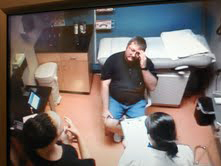Partnership improves medical access
UALR and the University of Arkansas for Medical Sciences have partnered to improve medical access to those who are deaf, deaf-blind, or hard of hearing.
The UALR Interpreter Education Program and UAMS Centers for Simulation Education are involved in an innovative new initiative that benefits both UALR interpreting students and UAMS medical students.
The partnership offers simulation education so students are better prepared to help those who are hearing impaired, according to Raphael James, a faculty member in the UALR Interpreter Education Program.
Pictured: “Coached” deaf patient, Rondale Ketchum, responds to an assessment performed by UAMS and UALR students.
Students from both UALR and UAMS work on coached “patients” trained to portray certain symptoms and emotional characteristics in a simulation lab designed to develop student skills in a real-world environment.
“Training through simulation has proven to be effective in many professions to enhance and hone the skills necessary for practice,” said James. “This is the first effort of this kind in the state and a prime example of our community partnerships.”
The interprofessional simulation is done on-site at the UAMS Centers for Simulation Education with the. Both learning teams, the UALR Interpreter Education students and the UAMS medical students, are evaluated during the simulation.
UAMS medical students are given feedback regarding their technique in the appropriate use of a sign language interpreter, their interaction with the patient who is deaf, deaf-blind, or hard of hearing, and their effectiveness in obtaining a “barrier-free” medical history.
UALR interpreting students are evaluated and provided feedback on their interaction with the health care professional, the patient, their linguistic equivalency, and the manner in which they handle the logistics of the situation.
UALR’s Interpreter Education Program replicates the partnership with seven additional community settings including social services, legal services, mental health services, religious and business settings, government agencies, and video relay and video remote services, said James.
For more information on the UALR Interpreter Education Program, contact James at rajames@ualr.edu or 501.569.3169.
